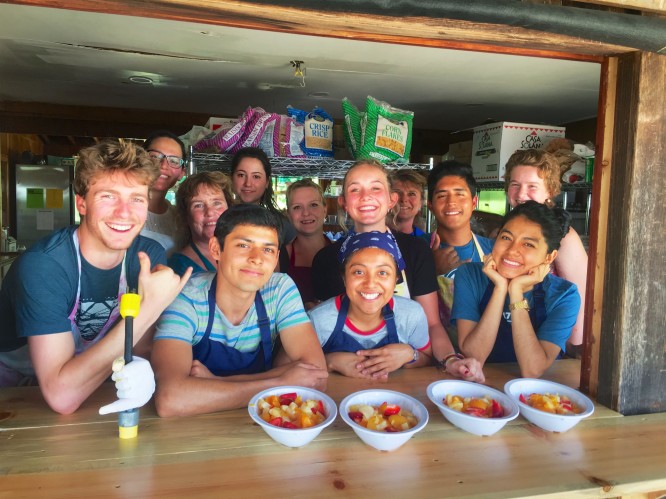Guest post by Lissy Abraham
As many Camp Trinity alumni know, the kitchen is undergoing its first renovation in the camp’s 85-year history. With so much attention focused on the kitchen project, I’ve been reflecting a lot on mealtimes at camp.
 I’m happy the new kitchen will have a more efficient layout and the kitchen crew will enjoy modern appliances, but there’s one item from the old kitchen that I hope to see in the new one: the carved wooden fork-and-spoon spinner. By pointing one utensil up, the kitchen let you know what to save for dessert—your fork (cake!), your spoon (pudding or ice cream!), or neither (Rice Krispy treats!).
I’m happy the new kitchen will have a more efficient layout and the kitchen crew will enjoy modern appliances, but there’s one item from the old kitchen that I hope to see in the new one: the carved wooden fork-and-spoon spinner. By pointing one utensil up, the kitchen let you know what to save for dessert—your fork (cake!), your spoon (pudding or ice cream!), or neither (Rice Krispy treats!).
The wooden spinner was just one of many dining rituals and routines passed down through generations of campers. Some were explicitly taught rules, some were gleaned through Grover’s homilies (stories and parables told after meals), and some were just understood—as “the Camp Trinity Way.”
These are some of the mealtime customs I remember from the ranch in the late ’60s and ’70s:
- Wait for everyone to arrive at the dining platform before sitting down at the table.
- Don’t serve yourself first. Offer food to the person on your left, then serve yourself and pass to the person on your right.
- Don’t reach for things; instead, say “Please pass the ______.” (Legend has it that during staff interviews Grover would ask a prospective candidate to pass the salt. If an interviewee didn’t also pass the pepper, they weren’t hired.)
- If you take the last of something, ask whether anyone at the table wants more and, if so, get more.
- However, only two people may be away from the table at once. (Not only does this rule help with traffic congestion, it also ensures a sense of continuity at the table, and means that no one is left lonely.)
- Wait for everyone to finish eating before starting to clear the table. It doesn’t matter if your table is the last one cleared; it’s not a race.
- When it’s time, one designated clearer gathers the silverware—except for the “up” utensil—dedicating each hand to either spoon or fork or knife, so that all of it can be easily dropped into the proper soaking bin. (Sorting at the source—camp was way ahead of its time on this concept.)
- While the clearer gathers the utensils, everyone else passes plates to the right, and each table head scrapes and stacks the plates with a spatula. (This method of dealing with dirty dishes is truly one of camp’s most brilliant life hacks; why isn’t it practiced everywhere?)
- Return everything to its proper place. Even if you’re too young to read the signs, you can still see that all the napkin dispensers go there. (“Put like things together”—the first principle of organization—is another life hack I learned at camp that’s served me well.)
- Wipe the table down after every meal.
- Each person at the table must be a clearer at some point during the week.
 Although I didn’t realize it as a camper, all of these mealtime rituals help instill Camp Trinity’s values of respect and cooperation. The rules are in place not only to ensure an efficient and amicable dining experience, but to help children learn to be polite and helpful.
Although I didn’t realize it as a camper, all of these mealtime rituals help instill Camp Trinity’s values of respect and cooperation. The rules are in place not only to ensure an efficient and amicable dining experience, but to help children learn to be polite and helpful.
Mealtimes even had their very own Grover homily: “When is the meal over?” Not when everyone finishes eating. Not when the table is cleared. Not even after announcements. The meal isn’t over until the last dish is cleaned and put away. Leave no trace. And remember to appreciate the kitchen crew—especially when there’s an old kitchen or no kitchen at all—for putting food in your belly three times a day.


